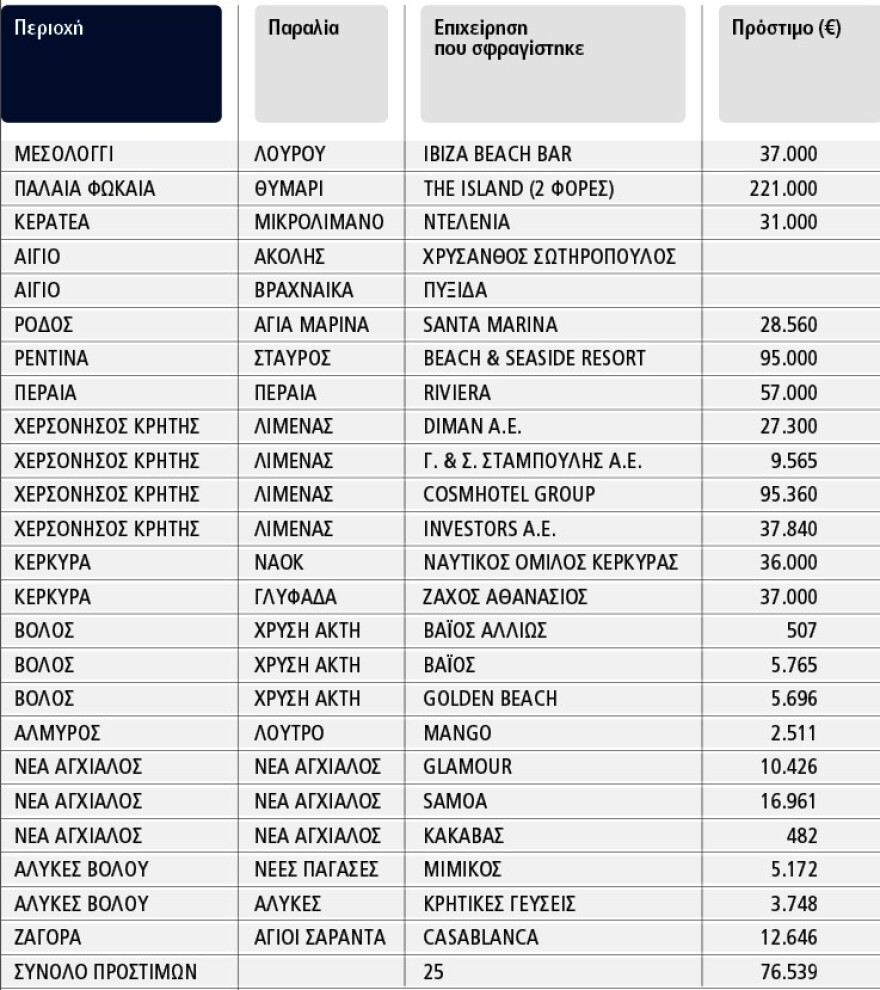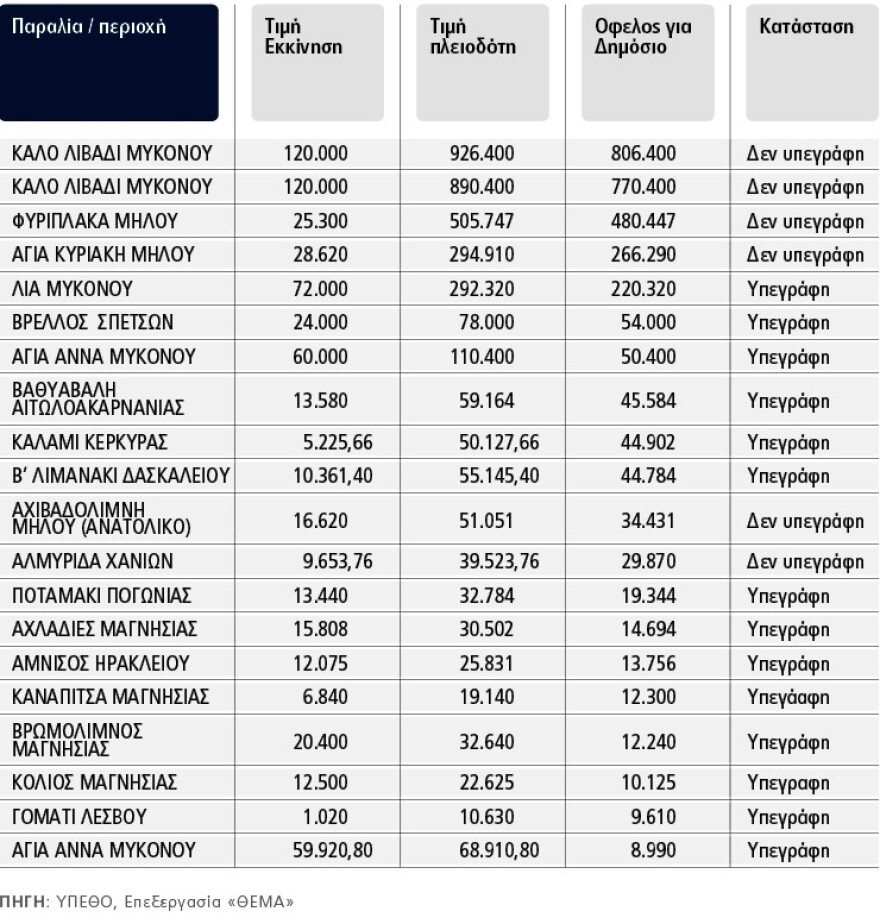Last year’s poor showing with the fight over the towel is being attempted this year by the Ministry of Economy and Finance to embellish the chaos on the beaches and bring some order to the mess.
Thus, it activated the General Secretariat of Public Property, took the long-suffering State Land Services out of the offices, set up a platform where all concession tenders are now done electronically and created a special complaints application MyCoast, which was put on the mobile phones of Greek and foreign tourists, causing the interest of journalistic networks that broadcast reports around the world about the huge mobilization of the state.
But while last year there was a battle for bathers to be able to find some space to lay out their towel, this year there is a battle to find… a refreshment and a place on a sunbed!

As in any battle, however, there are collateral damage: the new measures and controls on environmental protection, keeping distances and no-occupancy zones have brought about high compliance in the major tourist destinations, cutting off the local beach complex that did as they pleased. However, they severely limited the available sunbeds for bathers.
Especially in the very small beaches, but also in many cosmopolitan ones that are overrun every year by thousands of bathers (e.g. Mykonos, Milos, etc.) the umbrella sunbeds that were there last year have disappeared and are not expected to be put in even in August, when the summer season ends.
Friendly beaches are thus at risk of being left empty of sunbeds all summer, either because they were deemed unprofitable by would-be contractors, or because organised interests have put in place big money and are sabotaging the tenders by throwing a little money at them to “gun them down” so that they come up barren and invalid!
Side effects
.
A side effect was that from the complete promiscuity that existed on the beaches until last year, this year many were left without sunbeds and with only space for mats and towels! But side-effects are not only caused by strict controls or the delay in conducting electronic auctions, but also by business rivalries or powerful local interests that enter the tenders torpedoing the concession and compliance procedures.
The reasons are many and not so simple:
– The new type of electronic auctions were first implemented but were late to start or are still pending! In many concessions the sunbeds were put in from mid-July onwards, with the risk of losing the summer season.
– After objections and hurdles, many tenders eventually came to nothing, leaving hundreds of beaches without sunbeds.
– On the beaches that were successfully granted, bathers find half as many sunbeds as last year, because new types of controls (with drones,the MyCoast app, heavy fines or padlocks) have reduced overstays and trespassing by contractors.
For the first year of implementation of the new model of private beach exploitation, the Ministry of Economy and Finance aimed to catch up with 1,270 beach auctions, based on the concessions that existed last year. In the end, they exceeded 1,850, meaning 600 more were offered than last year! The state is thus collecting multiple revenues from beaches that until last year yielded very little.
On the other hand, however, the businessmen who were asked to pay double, triple or even ten times the rent to have the same or fewer sunbeds than they used to have are struggling to make ends meet by limiting umbrella seating and leaving fewer places for their customers. The problem is most acute on small beaches where the concession area allows for a minimum number of umbrella loungers to be used.
This is at a time when tourism is at an all-time high and municipal authorities are sending messages to residents urging them to limit their travel because there is no room for tourists to move!
In addition, 150-200 concession tenders have been barren. Sometimes no contractor emerged, other times the highest bidder failed to show up to sign contracts or was objected to and pressured by competitors to withdraw, while others failed to qualify while already selected as preferred contractors.

“We lost the deck chair”
Business owners claim that “procedures were delayed”, “time was lost from the tourist season” or the price was deemed “unaffordable” for too small a number of umbrellas per concession. On the other hand, the Ministry of Finance stresses that rents of other seasons, in the range of 1,000, 2,000 and 4,000 euros per year (season), are considered rather cheap for areas of 300-500 square meters in areas -friendly areas that attract crowds of tourists.As a result, for example:
– In some of the largest beaches of Milos, such as Agia Kyriaki or Mytaka, there are no sunbeds.
Last year, visitor reviews on TripAdvisor were all about Agia Kyriaki: “Awesome sea, just 30 euros a set of sunbeds, I think, is overkill! Plus 10 euros two coffees! Anyway, five days staying on the island, we will enjoy it!” But this year they write: “No sunbeds, bring an umbrella!”
– In Rhodes to resemble a deserted land now, the beach of Agia Marina which became famous for the illegal sunbeds in the sea, which were removed and the business closed down for serial violations of the terms of the beachfront concession contract.
– In Tinos, on the beach of Agios Sostis, the sunbeds will not operate this year.
In other cases, sunbeds were restricted, but not the war for a place in the sun, both on MyCoast and on networking apps.
For example, for small beaches like Kalogria in Stoupa, Messinia, reviews are being read around the world: “Nice sea, but that’s about it. In one shop they ask for umbrellas from 40-70 euros and in the other one they ask for free sunbeds with a minimum of 20 euros per person. First and last time I visit the place. It goes without saying that we didn’t sit on the sunbeds, but with our own umbrella”. “The beach is very small and almost full with organized sunbeds and charge 15, 12 and 10 euros. Although we went on a weekday, it was crowded.” “My Coast: first time a proper app from a government to quickly find out if there has been beach trespassing by sunbeds.”
The Facts
Practically, almost 20% or 1 in 5 sunbeds that were available last year were lost this year. This follows if you calculate that up until last year there were over 2,000 umbrella stands and coastal commercial operations (legal or illegal) operating.
While this year:
– 238 beaches were designated as inaccessible for the protection of the environment and marine life. Sunbeds were banned in areas such as Georgioupolis in Crete, West Milos, East Tinos, Kalogria in Achaia and Keros beach with its sand dunes in Lemnos. For the latter, however, the Ministry is considering requests to allow conditional use, starting next season.
Until last year, sunbeds were allowed in many areas or resorts, even where they should not even be there, because any human interference is prohibited, such as Laganas beach in Zakynthos where the Kareta-Karetta turtle breeds. Last year there were also dozens of arrests for sunbeds that didn’t even have a permit, and this year, naturally, they disappeared!
– For another 150-200 beaches the competitions were cancelled. Even though a bidder-contractor was appointed to take them over, he mysteriously “disappeared” and so the beaches remain empty to this day.
– About 1,300 of the 1,850 beaches where the concession was completed are operating with a reduced number of umbrella stands, as they must not cover more than 60% of the concession area.
– More than 300 beaches that have been granted and are located in Natura 2000 areas (but not remote) are allowed half the number of umbrella beds (covering an area of 30% instead of the 60% that applies to the others).

Cancelled – Barren auctions
Sealing and fines
Indicative of the pressure for more “places in the shade” is that even of the new concessions legally granted this year, 25 farms were identified and sealed for spreading too many sunbeds. The Land Services imposed fines ranging from 500 to 220,000 euros on a case-by-case basis (a total of over 775,000 or over 31,000 euros on average) and removed the extra sunbeds from the beach.
What was the result? Beaches with more room for mats and towels on one hand, but also beaches with fewer or no sunbeds and umbrella seats for those who would like to enjoy a swim in the shade with their coffee or an iced soft drink.
The Ministry of Environment reminds that delays or problems exist with every implementation of a new measure.
They record the results and the consequences, trying to provide solutions when problems or irregularities are found, such as at Balos beach in Crete where people were getting off the boats and getting up to their necks in the water, or the sand dunes of Keros beach in Lemnos, which had been exempted.
They estimate that from next year assignments will be made by March 31 (instead of late May – early June this year), leaving open the possibility of improvements next season.
War with interests
The Ministry of National Economy stresses that the institutionalization of electronic auctions and legality checks is of huge importance not only for the protection of public interest and state revenues, but, more importantly, because they put a damper on the actions of local actors and interests who were closing beaches to the milieu, blocking new players and depriving the public of a higher price.
Under the new rules, the concession powers have been taken away from the municipalities, which, however, are also winners from the electronic leasing system, as they get a share when more profit is made for the state coffers from the development of the country’s beaches.
And indeed, bids from businessmen for two-year leases of the beaches are being recorded that are several times higher than the original prices set by the Ministry of Environment and Tourism.
It is significant that the first auctions yielded 2,783,527 euros, more profit than the original price.
However, many suspicious transactions are also recorded that seem to conceal intentional private activities, aimed at cancelling the tenders and the revenues for the State!
In most cases, however, the businessmen honored their signature for a price of hundreds of thousands of euros and thus the State received what was agreed upon (such as 200,000 euros for the sunbeds at Elia beach in Mykonos), 60% of which ends up in the coffers of the municipalities.
However, when the tenders are unsuccessful and the state’s coffers are empty, the excessively high bids are a cause for concern, as they pose risks to the public interest (loss of revenue and distortion of competition, resulting in beaches being left unused). The Ministry of Finance will study ways to prevent such phenomena from recurring in the next application of the measure.
New rules and obligations
It should be noted that from this year, no concession of a seashore and beach is allowed when the length or width of the seashore is less than 4 meters or when the total area of the seashore is less than 150 square meters
In addition, concessionaires are required to ensure that:
– at least 50% of the beach must be left free,
– the area of each concession may not exceed 500 square metres,
– umbrella stands may occupy up to 60% of the concession area or 30% for beaches in Natura areas that have not been designated as remote,
– the distance between concessions must be at least 6 metres (3 metres on each side or 4 metres in the case of businesses operating in adjacent buildings),
– umbrella stands must be at least 4 metres from the sea for new concessions.
In any case, the public must have free, unhindered and safe access to the seashore and the beach, with special provisions for people with disabilities (such as through the installation of special platforms for their convenience, if they have not been installed by the municipality for the new concessions).
The site must be kept clean on a daily basis, taking care to maintain the balance of the ecosystem and the morphology of the coast.
.
Ask me anything
Explore related questions





